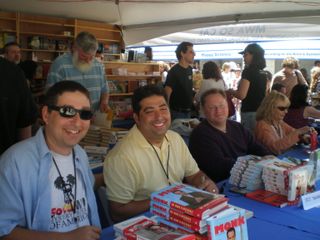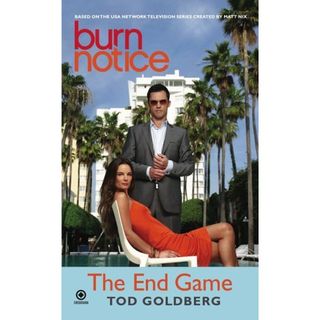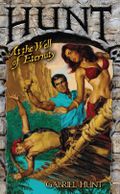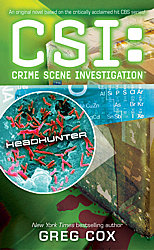 It was another fine day at the Los Angeles Times Festival of Books. I chatted with lots of authors and readers….and did a signing with my brother Tod, William Rabkin, Patricia Smiley and Denise Hamilton. BURN NOTICE creator Matt Nix also stopped by and signed some books wih Tod. I showed my MWA spirit, and my rippling muscles, by wearing the new SoCal MWA t-shirts that were hot-sellers at our booth.
It was another fine day at the Los Angeles Times Festival of Books. I chatted with lots of authors and readers….and did a signing with my brother Tod, William Rabkin, Patricia Smiley and Denise Hamilton. BURN NOTICE creator Matt Nix also stopped by and signed some books wih Tod. I showed my MWA spirit, and my rippling muscles, by wearing the new SoCal MWA t-shirts that were hot-sellers at our booth.
Writing
The End Game Has Got Game
 My brother Tod’s BURN NOTICE: THE END GAME got a rave from Rod Lott at Bookgasm, who says, in part:
My brother Tod’s BURN NOTICE: THE END GAME got a rave from Rod Lott at Bookgasm, who says, in part:
It is fun, capturing the show’s joyous, jubilant essence, but not, sadly, shots of well-endowed women in bikinis. […]The book is quick, snappy and forever mirthful — just like its source material. And until that starts back up in the summer, this is a fine substitute for a weekly fix.
Party Hearty
The Mystery Bookstore in Westwood and the Mystery Writers of America are hosting a big pre-Book Festival party at the store on Friday night, April 24, 5-9pm. Here's the skinny:
PRE-FESTIVAL OF BOOKS PARTY!
Join us for this annual celebration of crime fiction, featuring food, drink, and visits from dozens of our closest friends. Our guest list is always subject to last-minute changes, but these are some of the folks who have promised to join us:
Shilpa Agarwal, Brett Battles, James Scott Bell, Cara Black, Marc Blatte, Carol Higgins Clark, Mary Higgins Clark, Dianne Emley, Tom Epperson, Christa Faust, David Fuller, Michelle Gagnon, Victor Gischler, Lee Goldberg, Chris Grabenstein, Robert Greer, Denise Hamilton, Naomi Hirahara, Gregg Hurwitz, Sue Ann Jaffarian, Craig Johnson, Leslie Klinger, John Lescroart, Paul Levine, Sheila Lowe, Lisa Lutz, Robert Masello, George Mastras, T. Jefferson Parker, Gary Phillips, William Rabkin, Cornelia Read, Patricia Smiley, Susan Arnout Smith, Mark Haskell Smith, Eric Stone, Kelli Stanley, Louise Ure, Sarah Weinman, Stuart Woods, Robert Dugoni, Jeri Westerson, John Morgan Wilson and Edward Wright!
Day of the Living Dead
Today I was so jet-lagged that I felt like I was sleep walking around Munich. I know I looked like the undead. But I fortified myself with some tea and chocolate at Kafer before the big pitch and it went well. Between the sugar, caffeine and adreniline, I've managed to stay alert from mid-afternoon until right about now (8:30 pm on Thursday night). We had a post-pitch discussion over dinner and then on my way back to the hotel I treated myself to a Kopenhagener pastry for a job well done. I am going to go to bed as soon as I finish typing this post. Tomorrow morning I have a breakfast meeting with my friends at Hofmann & Voges Productions and then it's back to L.A. All in all, I think it was a very productive five days that I hope to build upon in the coming weeks.
Hot Dogging
Greetings from Munich. I arrived here on Tuesday night from London, where it was rainy and gray, to weather that felt more like Southern California than Germany. I guzzled Diet Coke on the flight so that I wouldn't fall asleep when I met my friends Daniela & David Tully for drinks at 9 p.m. Daniela is a top executive at ProSeiben, a major German network, and her American husband David is a screenwriter. It was great to see them again and to get caught up on the state of the German TV market (which is lousy, just like everywhere else).
The next morning I awoke to a beautiful day…clear blue skies, warm weather. It was the nicest weather I've ever had in Munich and I took full advantage of it, walking all over the city and discovering it anew. The best part was sitting in the Viktualienmarkt, eating a delicious hotdog and butter streusel, sipping Diet Coke, and enjoying the scenery.
I got back to the hotel in mid-afternoon for meetings with my friends at Action Concept, the studio I am working with over here. I ended the day with a nice long dinner at an outside table at an old Bavarian restaurant with Heiko Schmidt, the terrific line producer I worked with on FAST TRACK. I was in bed by midnight…but I awoke at 3:30 in the morning and couldn't get back to sleep. So I got up around 4, called home, answered some emails, and studied my notes for my meetings.
Now it's 7 a.m. I have been up for three-and-a-half hours already, and my meetings start with breakfast at 9. The most important meeting is at 3, when I will have to pitch three projects to a potential international coproduction partner. I hope I don't fall asleep in middle of it.
Tomorrow morning I head back to L.A….and hope to do some serious plotting for my next MONK book on the plane. On Monday I start jury duty.
I’m Leaving on a Jet Plane…
I am off to Europe in a few minutes for two and a half days in London and two and a half days in Munich. In London, I'll spend Easter Monday with actor Shaun Prendergast and his family (Shaun was one of the stars of my film FAST TRACK). On Tuesday, I'll be meeting my UK agent for the first time face-to-face for breakfast and then he's got meetings set up for me with some studios. Then I am jetting off to Munich, where I will be joining my good friends at Action Concept to pitch some projects to broadcasters. It's going to be a whirlwind week but I am really looking forward to it. It's been a year since I've been to Europe but it feels like much longer, especially after spending so many months working there in 2006 & 2007.
Appreciating Garforth’s Avengers
Novelist & TV writer Stephen Gallagher (perhaps best known here for creating THE ELEVENTH HOUR) stumbed on tie-in writer John Garforth's blog:
Garforth wrote four Avengers novels for Panther Books in 1967. Two years earlier Hodder and Stoughton had put outDeadline and Dead Duck, two rather classy tie-ins written by Peter Leslie but with Patrick Macnee credited as their author… which seemed as transparent and ludicrous to my eleven-year-old self as it does now.
Both had their virtues. Leslie's books read like a literary source from which the show might have been adapted; Garforth's Panthers were shorter, racier, and had a more contemporary feel to them. All were true tie-ins as opposed to novelisations; which is to say, they were original works based on the series' characters, and not pre-existing scripts adapted into prose form.
Nosebleed Heights of Adventure

My friend James Reasoner, one of the most prolific authors on earth, just got a starred review from Publishers Weekly for his HUNT AT THE WELL OF ETERNITY, the first in a new series of pulp adventures from Hard Case Crime. Each book is written by a different author under the "Gabriel Hunt" pen name, but it's James who kicks off the series with a bang:
James Reasoner (the Civil War Battle series) is the first to take the shared Hunt pen name and launch an adventure series that raises the action bar to nosebleed heights. After a mysterious beauty delivers a bloodstained Confederate flag and a whiskey bottle full of water to the Hunt brothers at a fund-raising reception, millionaire adventurer Gabriel Hunt and beautiful, gun-toting museum director Dr. Cierra Almanzar follow clues and an ambiguous map from Manhattan to Guatemala, only certain they're on the right path when somebody's shooting at them. Hunt, armed only with his fists, bullwhips, a Colt .45 double-action Peacemaker and a vintage Civil War muzzle loader, is often outnumbered but never outwitted. Pulp adventure fans will be thrilled to see the genre so smashingly resurrected.
Congratulations James! It's great to see him getting the recognition he so richly deserves.
2009 Scribe Award Nominees Announced

The International Association of Media Tie-In Writers
is pleased to announce this year's nominees for the 2009 Scribe Awards,
which honor excellence in licensed tie-in writing—novels based on TV
shows, movies, and games. The nominees for this year's awards are:
Best General Fiction Original
BURN NOTICE: THE FIX by Tod Goldberg
CRIMINAL MINDS: FINISHING SCHOOL by Max Allan Collins
CSI: HEADHUNTER by Greg Cox
Best General Fiction Adapted
DEATH DEFYING ACTS by Greg Cox
INDIANA JONES AND THE KINGDOM OF THE CRYSTAL SKULL by James Rollins
THE TUDORS: KING TAKES QUEEN by Elizabeth Massie
THE WACKNESS by Dale C. Phillips
X-FILES: I WANT TO BELIEVE by Max Allan Collins
Best Speculative Fiction Original
GHOST WHISPERER: REVENGE by Doranna Durgin
RAVENLOFT: THE COVENANT, HEAVEN'S BONES by Samantha Henderson
STARGATE SG-1: HYDRA by Holly Scott & Jamie Duncan
STAR TREK: TEROK NOR, DAY OF THE VIPERS by James Swallow
HELLBOY II: THE GOLDEN ARMY by Bob Greenberger
STAR WARS – THE CLONE WARS: WILD SPACE by Karen Miller
Best Young Adult Original
DR. WHO: THE EYELESS by Lance Parkin
PRIMEVAL: SHADOW OF THE JAGUAR by Steven Savile
DISNEY CLUB PENGUIN: STOWAWAY! ADVENTURES AT SEA by Tracey West
Best Young Adult Adapted
IRON MAN: THE JUNIOR NOVEL by Stephen D. Sullivan
THE DARK KNIGHT: THE JUNIOR NOVEL by Stacia Deutsch and Rhody Cohen
JOURNEY TO THE CENTER OF THE EARTH 3D by Tracey West
The high
est honor the IAMTW can bestow is the Grandmaster Award, which recognizes a writer for his or her extensive and exceptional work in the tie-in field. This year's honoree is KEITH R.A. DeCANDIDO. He has written over thirty novels, most of them original tie-ins or novelizations. His work includes many Star Trek novels, as well as original books in the CSI: NY and Supernatural tie-in series, to name just a few.
Third Annual Scribes will be awarded at a special ceremony at Comic-Con
in San Diego July 23-29. (Specific date and time to be announced)
The IAMTW also awards tw
o Special Gaming Scribes, honoring excellence in game-related tie-ins. Those awards are given at GenCon in Indianapolis August 13-16 2009 (http://www.gencon.com/2009/indy/default.aspx. Specific date and time of the ceremony to be announced) The nominees are:Special Gaming Scribe – Best Original
EBERRON: THE INQUISITIVES, THE DARKWOOD MASK by Jeff LaSala
DRAGONLANCE: DEATH MARCH
by Jean Rabe
EBERRON: THE DOOM OF KINGS by Don Bassingthwaite
WARHAMMER: ELFSLAYER by Nathan Long
Special Gaming Scribe – Best Adapted
METAL GEAR SOLID by Raymond Benson For more information about the IAMTW (I AM a Tie-in Writer), please visit our site at www.iamtw.org
Congratulations to all the nominees and special thanks to all of our judges for their hard work.
“Take Me To Your Leader, Lee Goldberg”
One of the biggest, most persistent, and bone-headed cliches in TV & movie science fiction is the alien and/or robot who enunciates every syllable when he speaks, doesn’t use contractions, and calls everyone by their full name. Where did these aliens learn English? From watching movies about space aliens coming to earth? They can master travel at light speed, but can’t figure out how to say “don’t” instead of “do not?” Or why doesn’t someone, as William Rabkin laments, ever tell them:
“In English, we have a last name that we share with our family and a first name that uniquely identifies us. And if you want to pass unrecognized as an alien, it’s important that you learn this distinction.”
So why does this ridiculous conceit continue in movie after movie? Pure laziness […]it’s such a hideous cliche by now that you’d think even the aliens would have figured it out…
Apparently, the new WITCH MOUNTAIN remake is the latest offender to perpetuate this hoary cliche…



